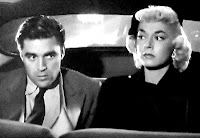 In Baghdad, Ali, the young son of the Caliph, and Amara, the young daughter of the Caliph's advisor Cassim, make a blood oath to solidify their pledge of love, but not long after, Cassim, working with the Mongols, betrays the Caliph who is killed. Ali escapes into the desert where he discovers the secret hiding place of a band of thieves, in a deep mountain cave which opens up only to the phrase, "Open, O sesame." The thieves adopt him, naming him Ali Baba, and soon they become a small resistance band against the Mongols. Years later, Amara is to be married to the pretender Caliph, Kahn. When Ali, the new leader of the thieves, recognizes Amara as his childhood sweetheart, he leads a raid to rescue Amara from marriage to the evil Kahn.
In Baghdad, Ali, the young son of the Caliph, and Amara, the young daughter of the Caliph's advisor Cassim, make a blood oath to solidify their pledge of love, but not long after, Cassim, working with the Mongols, betrays the Caliph who is killed. Ali escapes into the desert where he discovers the secret hiding place of a band of thieves, in a deep mountain cave which opens up only to the phrase, "Open, O sesame." The thieves adopt him, naming him Ali Baba, and soon they become a small resistance band against the Mongols. Years later, Amara is to be married to the pretender Caliph, Kahn. When Ali, the new leader of the thieves, recognizes Amara as his childhood sweetheart, he leads a raid to rescue Amara from marriage to the evil Kahn. Like the earlier ARABIAN NIGHTS, this pairing of Jon Hall (Ali) and Maria Montez (Amara), both pictured at right, is a colorful and fun adventure film with good sets and costumes, an appropriate amount of comic relief, and lots of rousing action scenes. Hall is never quite up to the standards of a grade-A screen hero (like Tyrone Power or Errol Flynn) but he suffices. Montez pretty much gives one-note performances, but her exotic looks make up for her acting weaknesses. Andy Devine, as Abdullah, Ali's protector, is amusing but never obnoxiously so. Standouts in the supporting cast include Scotty Beckett as the young Ali, Turhan Bey as a slave to Amana who winds up helping the thieves, Frank Puglia as Cassim, and Fortunio Bononova as the head of the thieves. [DVD]











